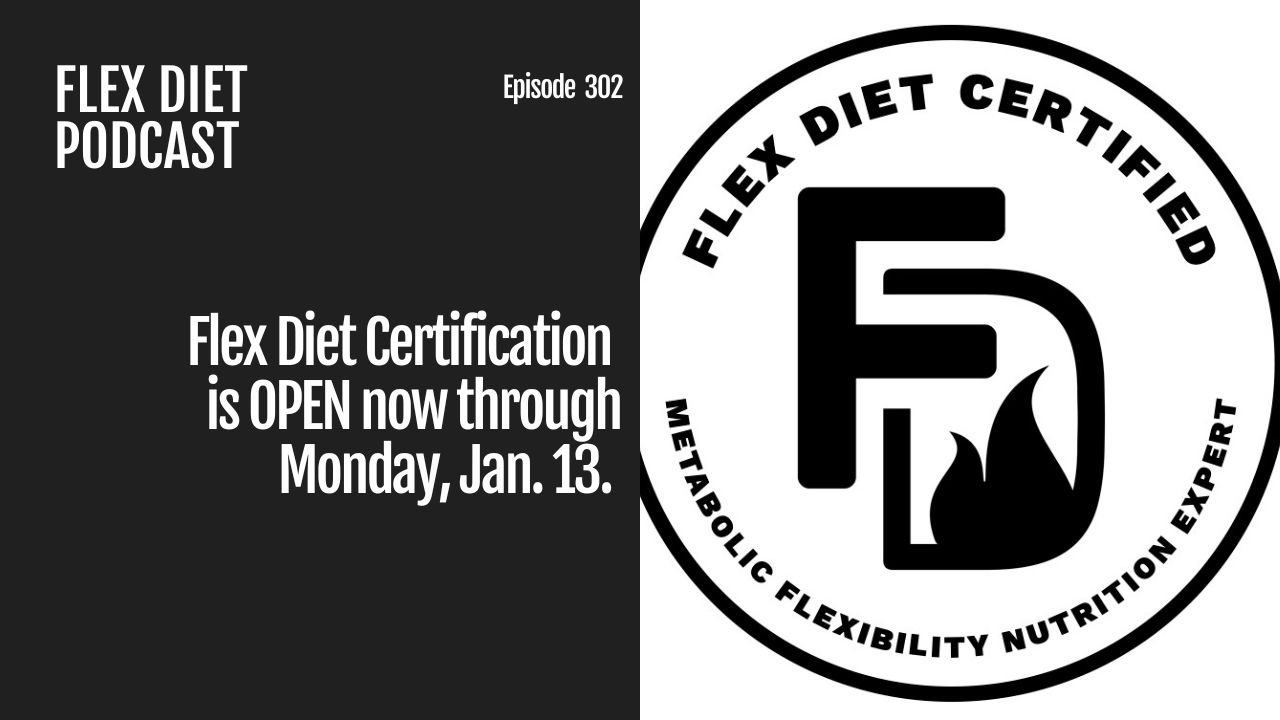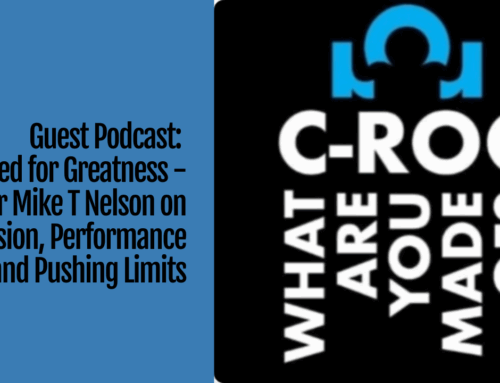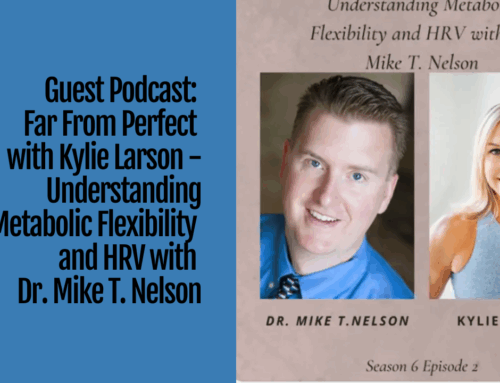In this solo episode of the Flex Diet Podcast, I announce the opening of the Flex Diet Certification and highlight its key features and benefits. I explain the difference between the Flex Diet Cert, which focuses on nutrition and recovery, and the Physiologic Flexibility Cert, which deals with advanced resilience and recovery strategies.
Emphasizing a habit-based approach, I cover core topics such as metabolic flexibility, macronutrient usage, and improved body composition. Additionally, I discuss the bonus items available for early enrollees and my certifications’ overall expansion model aimed at long-term health and performance success.
- Tecton Life Ketone drink! https://tectonlife.com/ DRMIKE to save 20%
- LMNT electrolyte drink mix: miketnelsonlmnt.com
- Dr. Mike’s Fitness Insider Newsletter: Sign up for free here.
Available now:
- Grab a copy of the Triphasic Training II book I co-wrote with Cal Deitz here.
Episode Chapters:
-
02:25 Understanding the Flex Diet and Physiologic Flexibility Certifications
- 04:15 The Framework and Philosophy Behind Flex Diet
- 08:02 The Expansion Model and Its Benefits
- 18:55 Expert Interviews and Additional Resources
Get In Touch with Dr Mike:
Rock on!


Dr. Mike T Nelson
PhD, MSME, CISSN, CSCS Carrick Institute Adjunct Professor Dr. Mike T. Nelson has spent 18 years of his life learning how the human body works, specifically focusing on how to properly condition it to burn fat and become stronger, more flexible, and healthier. He’s has a PhD in Exercise Physiology, a BA in Natural Science, and an MS in Biomechanics. He’s an adjunct professor and a member of the American College of Sports Medicine. He’s been called in to share his techniques with top government agencies. The techniques he’s developed and the results Mike gets for his clients have been featured in international magazines, in scientific publications, and on websites across the globe.
- PhD in Exercise Physiology
- BA in Natural Science
- MS in Biomechanics
- Adjunct Professor in Human
- Performance for Carrick Institute for Functional Neurology
- Adjunct Professor and Member of American College of Sports Medicine
- Instructor at Broadview University
- Professional Nutritional
- Member of the American Society for Nutrition
- Professional Sports Nutrition
- Member of the International Society for Sports Nutrition
- Professional NSCA Member
Dr Mike T Nelson: [00:00:00] Hey, welcome back to the Flex Diet Podcast. I’m your host Dr. Mike T. Nelson. On this podcast, we talk about all things to increase muscle performance and improve body composition, all without destroying your health in a flexible framework. Today, this is just a shorter solo podcast. We’ve got another guest coming up this week again.
I wanted to let you know that the Flex Diet certification is now open. This is as of today, which is Monday, January 6th. If you are interested in that, I will put a link down below, and it will be open until midnight. Monday, January 13th. This is 2005 although I do [00:01:00] have some fast action bonus items For example, I’m giving away The whole advanced modules to the flex diet cert.
I initially thought about selling this as a level two But I have opted to give it away as a fast action bonus if you sign up before this coming Wednesday at midnight You I also have an exclusive talk all about sports supplementation that I did in Costa Rica a few years ago. It’s never been released to the public.
And if you sign up before Tuesday night at midnight, I’ll actually give you a one hour private call with me. So 250 value at no cost. And on top of that, I’ve got even more bonus items listed on the sales page there with all the information at the link down below. So that’s the first item in the podcast.
I want to let you know that that is open. If you have any questions, let [00:02:00] me know. If you’re on the newsletter, you’ll see a lot more information about it. It does not open again until June is the plan so far. So right now the FlexiDi insert opens twice a year and the Physiologic Flexibility Cert opens twice a year.
So once per quarter on either one of those. And the difference is the Flex Diet Cert is kind of like the O Tru Level 1 and it’s based on primarily nutrition coaching and recovery. So we have eight interventions that covers everything from protein, fats, carbohydrates, We’re going to talk a little bit about exercise, and even NEAT, so non exercise activity, thermogenesis, walking, and micronutrition, sleep, intermittent fasting, and a whole bunch more.
And once you are at, I would say [00:03:00] like a B student with all of those, then the Physiologic Flexibility Cert, which is kind of like the Level 2, would be the next one. And in that one, which is opening up in March again that’s where we look at what are some of the advanced things you should look at to become more resilient, anti fragile, more robust, and increase your recovery ability.
In the PhysSelect cert, we look at the four main pillars, which is going to be number one temperature, sauna to cold water immersion. Two, pH changes. Everything from different breathing techniques to true high intensity. Number three is going to be in expanded fuels. This is expanded from the metabolic flexibility discussed in the Flex Diet Cert, which is open now.
And in the PhysFlex Cert, we talk about ketones to lactate, and then we also talk about oxygen and CO2 regulation. So I wanted to just highlight, because one of the questions I get [00:04:00] a fair amount is, what is the difference between the FlexDiet Cert, which is open now versus the PhysFlexCert, which again will be opening in March in Q2.
So that’s the difference between those two. And the other main component I wanted to talk about is just the, I guess, overall framework at a high, level of how these kind of play together and why I think it’s useful. Yes, you can get results. You know, the general nutrition coaching is you’re either a macros kind of base coach or you do habits.
And again, I’ve used both. I don’t think there’s a right or wrong per se with my more advanced clients and in my one on one practice, I tend to use more macro based. Although I have used habit based and I still revert back to that. The Flexiday insert on purpose does not necessarily talk ever about counting [00:05:00] macros.
It is very much a habit based progression. And the two main reasons for that is one, I think most people do much better with that progression. And then two, part of it is just some of the legality of logistics that, you know, we’ve had people complete it from all over the world from many countries in the UK, Netherlands, Sweden, Finland the UK, Australia, New Zealand, a bunch of people in Canada Russia, I’m sure there’s a bunch of other countries I’m leaving out.
But even just in different states within the U. S., the legislation about what you can kind of formally say and being prescriptive with macros might be kind of an issue. So if you’re doing a habit based, you can definitely talk about nutrition. One of the things that is going away is this belief that if you are a trainer that you cannot talk about nutrition.[00:06:00]
And that is not true. Now it is true that unless you have a specific license, which in a lot of places is an MD or an RD or even some other different types of licensure, you can be a little bit more prescriptive with macronutrients. And again, depending upon your licensure, you may be able to prescribe certain diets for a medical reason.
But that’s not what we’re talking about here. We’re just talking about general health, performance, and body composition. In every state that I’ve seen so far, again, this is not legal advice. Check with your own attorney. From what I have seen, you can still educate your clients on what are better nutrition, and recovery, and sleep things they should do, and have a system to hold them accountable.
And I wanted to talk a little bit about the kind of higher level thought of [00:07:00] why I did the FlexiDiet cert. It would have been more simple to just say, you know, Hey, here’s a bunch of habits you should do. And we just great clients on if they do them or not. But if we back up and think about what is the framework we’re trying to do, My bias is twofold.
One, we want to get clients the results that they’re paying us for as coaches, of course. But number two is we want to do that in a way that’s going to set them up for long term success. And I think a lot of the sort of diet industry is just telling people to white knuckle their way through it.
Now again, this doesn’t mean there’s not going to be, you know, effort. And this doesn’t mean that it’s always 100 percent easy all the time. That’s definitely not true. Bye. I think we’re doing clients a disservice by just slashing calories from them all of the time. And when they’re done working with us, we expect that they are able to sustain this low caloric system or [00:08:00] setup for the rest of their life.
So with the Flex Diet Cert, the main goal is actually an expansion, not a restriction based model. And in the interventions, it’s all about telling clients, or possibly yourself if you’re a fitness enthusiast, and we have about 60 percent of coaches that go through and about 40 percent are just fitness enthusiasts who want to learn more for themselves, that these are the things you should do as an expansion.
So for example, here’s when you should eat more protein, here’s how much, here’s all the reasons why protein is important. Same thing with NEAT. Here’s all the very cool studies on NEAT, which is actually burning more calories than formal exercise for the vast majority of people. Things like walking, twitching, and moving around.
Those are incredibly important for general health and for body composition. Even sleep. Here’s how to get better sleep. Here’s how to sleep more. So the emphasis is on teaching people the action items they should [00:09:00] do. not necessarily making them feel bad all the time and saying, Oh, just stop eating Oreos.
Oh, you idiot client. Why can’t you stop eating Oreos? I told you to stop eating Oreos. You’re supposed to listen to me. I’m the coach, which is just kind of stupid advice. Yes, at some point clients may need to eat fewer Oreos, but how do you get them to do that? And how do you still get them the result?
If you could get them the result while allowing them to still eat some Oreos, They’re going to be more compliant and they’re going to be able to do that in a long term basis. So to do that we emphasize things like eating more vegetables, eating more micronutrition, eating more protein, exercise, walking more, sleeping better, etc.
This also works better from a psychological standpoint because humans are very visual based in their thinking process. The example I use all the time is if I told you not to [00:10:00] think of a pink elephant, I can guarantee you just thought of a pink elephant. Even though I told you, don’t think of the pink elephant.
So we tend to think of things visually, not the opposite. So by telling clients, I want you to focus more on protein, getting your step count in, getting to the gym, doing exercise, steps to improve your sleep, etc. We are emphasizing, both consciously and subconsciously, the thing that we want them to do better.
This is also an expansion based model. So that once they are done working with you, they have a higher metabolic rate, they’re burning more total calories per day, what’s called total daily energy expenditure, and the subset of that related to metabolic flexibility, which is what it’s based on, they are actually burning the right fuels at the right time.
Because again, I think there’s too much emphasis on just the [00:11:00] sheer numbers of calories that are associated with your resting metabolic rate, which can change, but it doesn’t change a whole lot unless you’re under very dramatic and kind of drastic scenarios. And even then, it doesn’t move more than a few hundred calories per day on an individual basis.
Yes, you will see big differences across different individuals, but that’s mainly because of different muscle mass and different body size. On an individual level, it doesn’t really change a whole lot. Now you want to preserve that and you want to keep it as high as possible, but unless you lost just a massive ton of muscle or had something else happen, your resting metabolic rate doesn’t change a whole lot.
So I think there’s an overemphasis placed on that. Second part is the total number of calories. We ideally want to be at a higher, what’s called flux rate. So a higher amount of calories in, higher amount of calories out. That is just going to be much, much more sustainable in real life. The example I give is [00:12:00] if you have to keep your weight stable at the mythical 1, 250 calories per day.
Don’t ask me why that number always seems to show up for women. For guys it’s like 1, 800 versus someone who could be weight stable as a woman that’s a 2, 200 calories or a guy. 2800 calories. Yes, you do have to put some time into exercise and movement, which has tons of other health benefits, but it’s going to be way easier at a higher flux rate to be able to maintain that in the real world.
So we’re living in a world full of calories, then to just expect yourself to white knuckle your way through 1200 calories, the rest of your life. And then you go over a little bit and you gain weight. The subset of that It’s teaching people how to use fat as the correct fuel when needed and still use carbohydrates as a fuel when needed.[00:13:00]
So when you’re doing your low intensity cardio or doing some walks in the morning, ideally you want to be able to use fat primarily as a fuel and even just low intensity neat movement during the day. However, you still want the ability to up regulate and to use carbohydrates during the time. that you’re doing higher intensity exercise.
Because you want to emphasize performance. Most people have some performance goal, even if it’s just lifting more weights in the gym, which is totally fine. That’s awesome. Most people have a goal that they want to transfer to something else. I like doing a lot of kiteboarding and grip stuff. Maybe it’s just play with your grandkids, play pickleball, go skiing on the weekend, et cetera.
So performance, for everyone on my bias, is still going to be a priority. We want the ability to use carbohydrates to fuel that level of performance. So we want metabolic flexibility, the ability to use [00:14:00] carbohydrates on one end of the spectrum, the ability to use fat on the other end of the spectrum, and the ability to switch back and forth.
And switching back and forth should be more of an, almost an unconscious physiologic process. So that way, it makes it much easier for you to still have performance gains and to get a better body composition over time, because your body is more effective at using fat when it needs to, but we’re still seeing performance gains by using carbohydrates when we need to.
So again, I think there’s been an overemphasis on resting metabolic rate and just probably an overemphasis on just the total number. of calories in and out, and not looking at doing that at a higher flux rate, and also teaching the body to use fat as a fuel and carbohydrates as a fuel, a la metabolic flexibility.
So that is the basis of the Flux Diet [00:15:00] certification. So the benefit is, once clients learn the system and go through it, they can literally go about their life with less conscious oversight. Yeah, at some point, you’re probably gonna, you know, may need a little more oversight here and there, but the goal is to train your body to expand your current capacity, so that if you have a meal that’s high in carbohydrates, all that metabolic flexibility, you can switch to oxidizing more of those carbohydrates, you can apply it better in your training, and when you have periods of time where you’re not consuming calories, you can easily switch to using fat as a fuel, So you can go about doing whatever activities you need to do because you’re using fat as a fuel.
You’re not getting stuck on either end of the spectrum, which I know kind of goes against all the kind of popular diet trends of, you know, just only eat high carbohydrates or only eat high fat. [00:16:00] Like you don’t need any carbohydrates or you need to do some extreme, you know, carnivore protein only, you know, type diet.
Most people. are living in the real world where they’re going to have some protein, they’re going to have some fat, and they’re going to have some carbohydrates. And you want to train your body to handle all of those in the most effective manner so you can still see gains in performance muscle and still reach your body composition goals.
So that is the main reason for the FlexDiet Cert. It is based on more of an expansion model. And the benefit is if you are more metabolically flexible, by definition, you have a healthier metabolism. We can do all sorts of crazy stuff to have you lose weight in the short term, but that’s not going to be best for your health and nor is it going to be sustainable.
And maybe there’s a time and a place for that for certain athletes. If you need an extreme weight cut and you have a sport and you’re competing at a [00:17:00] professional level where you’re potentially making millions of dollars, But most people don’t have too much of a problem losing weight. They have an issue keeping the weight off.
My bias is that they go about it in a way where they are only focused on restriction. They’re not looking at expansion of their body’s current capacity to use more fuels, to use fat better, to use carbohydrates better, to have your body self regulate better, so you’re not feeling like you’re starving all the time.
And you can easily oscillate between periods of say higher carbohydrate intake and periods of time where maybe just choose to do a period of fasting where you’re using fat as a fuel source. So that is the genesis of that and it is on sale or open for enrollment right now. They have a link down below with all of the details.
As I mentioned, we do have some fast action bonus items that go away. The call goes away Tuesday night and [00:18:00] The advanced modules go away on Wednesday. We do have some other bonus items there on the enrollment page. If you have any questions on that, please email me. You’ll also notice on the enrollment page, we’ve got a lot of expert interviews too.
So not only will you learn the big picture of metabolic flexibility, the details of each intervention, which is all based on research. And then you’ll learn exactly what to do by the five explicit action items for each intervention. So a lot of certifications are either really good at telling you what to do, but they don’t give you any reason why, or they’re pretty good at explaining the why, but then you’re just kind of left to apply it on your own.
I wanted something where you know exactly how to apply it, and you understand the reason why you’re going to apply it. Last part is we have a lot of, like I said, expert interviews, you know, tons of people on there from [00:19:00] Dr. Dan party talking about sleep, Dr. Hunter Waldman talking about metabolic flexibility, Dr.
Eric Helms about flexible dieting, Dr. Mike Ormsby about protein and protein before bed. Dr. Peter Fishman about looking at contest preparation and more of the extreme side of flexible dieting and what you would do for that. Dr. Jose Antonio about just feeding humans massive amounts of protein. Dr.
Stu Phillips, one of the premier protein researchers in the world about the role of protein and how it affects it. And even other expert interviews there too. So check out all the information there. If you have any questions hit me up. If you want more information, I’ve got a ton of stuff going out to the newsletter.
This week, let’s go to www. MikeTNelson. com. You’ll find a little link for the newsletter. And all the information on the FlexDiet cert is there below. It is open now as of Monday, January 6th through Monday, January [00:20:00] 13th, 2025, and ends at midnight Pacific Standard Time. Thank you so much. Really appreciate it.
As always, thank you so much for listening to the podcast and we will have another bonus guest interview coming up this week. Thank you.
This podcast is for informational purposes only. The podcast is not intended as a substitute for professional medical advice, diagnosis, or treatment. You should not use the information on the podcast for diagnosing or treating a health problem or disease or prescribing any medication or other treatment.
Always seek the advice of your physician or other qualified health provider before taking any medication. Or nutritional supplement and with any questions you may have regarding a medical condition. Never disregard professional medical advice or delay in seeking it because of something you have heard on this or any other podcast.
Reliance on the podcast is solely at your own risk. Information provided on the podcast does not create a doctor patient relationship [00:21:00] between you and any of the health professionals affiliated with our podcast. Information and statements regarding dietary supplements are not intended to diagnose, treat, cure, or prevent any disease.
Opinions of guests are their own, and this podcast does not endorse or accept responsibility for statements made by guests. This podcast does not make any representations or warranties about guest qualifications or credibility. Individuals on this podcast may have a direct or indirect financial interest in products or services referred to therein.
If you think you have a medical problem, consult a licensed physician.















Leave A Comment